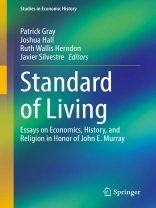This anthology honors the life and work of American economist John E. Murray, whose work on the evolution of the standard of living spanned multiple disciplines. Publishing extensively in the areas of the history of healthcare and health insurance, labor markets, religion, and family-related issues from education to orphanages, fertility, and marriage, Murray was much more than an economic historian and his influence can be felt across the wider scholarly community. Written by Murray’s academic collaborators, mentors, and mentees, this collection of essays covers topics such as the effect of the 1918 influenza pandemic on U.S. life insurance holdings, the relationship between rapid economic growth and type 2 diabetes, and the economics of the early church. This volume will be of use to scholars and students interested in economic history, cliometrics, labor economics, and American and European history, as well as the history of religion.
Table of Content
Urbanization, Sanitation, and Mortality in the Progressive Era, 1899-1929.- The Continuing Puzzle of Hypertension among African Americans: Developmental Origins and the Mid-century Socioeconomic Transformation.- Health and Safety vs. Freedom of Contract: The Tortured Path of Wage and Hours Limits Through the State Legislatures and the Courts.- Sickness Experience in England, 1870-1949.- Friendly societies and sickness coverage in the absence of state provision in Spain (1870-1935).- A difficult consensus: the making of the Spanish welfare state.- The Effect of the 1918 Influenza Pandemic on U.S. Life Insurance Holdings.- ‘Theft of Oneself’: Runaway Servants in Early Maryland—Deterrence, Punishment, and Apprehension.- Adult Guardianship and Local Politics in Rhode Island, 1750-1800.- Later-life realizations of Maryland’s mid-nineteenth-century pauper apprentices.- Family Allocation Strategy in the Late Nineteenth Century.- Child Labor and Industrialization in Early Republican Turkey.- Orphans, Widows, and the Economics of the Early Church.- An Economic Approach to Religious Communes: The Shakers.- Religion, Human Capital, and Economic Diversity in 19th Century Hesse-Cassel.- Productivity, Mortality, and Technology in European and US Coal Mining, 1800-1913.- Breathing Apparatus for Mine Rescue in the UK, 1890s – 1920s.- Grain Market Integration in Late Colonial Mexico.- ‘William Mc Kinley, Optimal Reneging, and the Spanish-American War’.- Capitalism and the Good Society: The Original Case for and against Commerce.- Situating Southern Influences in James M. Buchanan and Modern Public Choice Economics.- Index.
About the author
Patrick Gray is Professor of Religious Studies at Rhodes College (US). He received his Ph.D. in religion from Emory University (US). His research focuses on the Greco-Roman context of early Christianity and the history of biblical interpretation. His publications include Varieties of Religious Invention: Founders and their Functions in History (Oxford University Press, 2016) and The Routledge Guidebook to the New Testament (Routledge, 2017).
Joshua Hall is a Professor of Economics, Chair of the Department of Economics, and Director of the Center for Free Enterprise, all in the John Chambers College of Business & Economics at West Virginia University (US). He earned his bachelor and master degrees in economics from Ohio University and his Ph.D. from West Virginia University. Prior to returning to his alma mater, he was the Elbert H. Neese, Jr. Professor of Economics at Beloit College (US). Hall is a Past President of the Association of Private Enterprise Educationand is also a Senior Fellow at the Fraser Institute.
Ruth Wallis Herndon is Emerita Professor of History at Bowling Green State University (US). Her research focuses on early American social history, with a special emphasis on marginalized people in the colonial and Revolutionary eras–children, women, the poor, servants, and slaves. She received a Ph. D in history from The American University. Major publications include a monograph on the transient poor in the eighteenth century, Unwelcome Americans: Living on the Margin in Early New England (University of Pennsylvania Press, 2001), and an anthology (co-edited with John E. Murray), Children Bound to Labor: Pauper Apprenticeship in Early America (Cornell University Press, 2009).
Javier Silvestre is Professor of Economics in the Department of Applied Economics at the University of Zaragoza (Spain). He received his Ph.D. in economics at the University of Zaragoza. His research focuses on migration, population dynamics, history of workplace safety, and history of coal mining.












